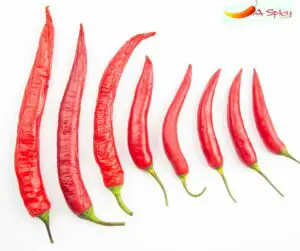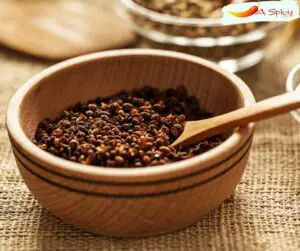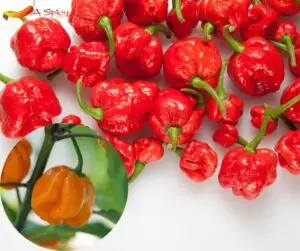
The long pepper, Piper longum, is a tropical vine that is cultivated for its fruits. These fruits are dried and used as a spice in many cuisines around the world. The name “long pepper” comes from the plant’s botanical name, Piper longum, which means “long pepper.”
Long pepper is often confused with black pepper (Piper nigrum), but they are different plants and have different uses in cooking. Black peppercorns are actually not peppercorns at all, they’ve actually dried berries from an entirely different plant.
Does Long Pepper Have Capsicum?

No, they do not have capsicum. Long pepper is an exotic spice with a distinctive flavor. You can find it under many names, including long pepper, pipal, and Indian long pepper. All these names refer to the same type of spice: Piper longum.
Both chili peppers and long peppers belong to the family Solanaceae (which also contains eggplants and tomatoes). However, they are not related botanically—in fact, they are from different genera (Solanum and Piper).
So if you like your food spicy and hot but don’t want to add any capsicum to it then you don’t have to worry about getting this ingredient in your diet anymore.
Is Long Pepper Healthy?
Yes, long pepper is healthy. Long pepper is a good source of vitamin A, which helps to keep your eyes healthy. The essential fatty acids in long pepper help to improve your skin’s elasticity and prevent sagging. Additionally, it has been used for centuries to treat respiratory issues such as asthma, bronchitis, and other respiratory infections. Long pepper has also been used as an anti-inflammatory agent to treat joint pain and arthritis symptoms by reducing inflammation in the body.
Long Pepper Medicinal Uses
1. It is used in ayurvedic medicine
Long pepper, like black pepper, is a common ingredient in ayurvedic medicine. It’s used to treat coughs and asthma and as an expectorant that can help break up mucus from the lungs.
2. Long pepper is rich in vitamin A
Long pepper is rich in vitamin A, which is an essential nutrient for healthy vision. It also helps to maintain a healthy immune system and contributes to the growth and repair of skin, hair, and nails.
In addition to its nutritional value, long pepper contains other important nutrients like magnesium (important for maintaining muscle function), potassium (which helps control blood pressure), and manganese (which plays a role in bone metabolism).
3. Long pepper helps boost your libido and fertility
Long pepper contains piperine, an alkaloid compound that helps boost testosterone levels in the body. It has been used as a natural aphrodisiac in India for centuries. Piperine is also responsible for the hotness of long pepper’s taste, which increases blood flow to the genitals, making them more sensitive and arousing.
Men with low libido because of its pungent smell and spicy flavor when chewed or ingested orally can use it as a sexual stimulant long pepper.
4. Long pepper can help treat respiratory issues
Long pepper is a natural expectorant and can help relieve a cough or cold. It also has other health benefits besides helping with respiratory issues.
Long pepper is known to help clear nasal congestion in people who suffer from rhinitis (inflammation of the nose). It’s also good for sinus issues since it helps reduce inflammation in the sinus cavity by opening airways and making breathing easier.
5. Long pepper has antiviral properties
Long pepper has antiviral properties and can help treat colds, coughs, and flu. It’s also good for the respiratory system since it helps clear congestion.
Long pepper is one of the oldest known spices to humans, dating back to ancient India where it was used as a medicinal herb. There are many varieties of long pepper but they all have similar properties: they’re aromatic; have a slightly bitter taste; have an earthy scent (similar to black peppercorns), and add depth to any dish you’re cooking up.
6. Long pepper promotes healthy digestion
Long pepper is also an excellent digestive tonic. It can be used to treat indigestion, bloating, and flatulence (gas).
Long pepper stimulates the secretion of gastric juices and helps relieve stomach spasms that cause nausea or vomiting.
If your digestion is suffering from one of these disorders, long pepper may help restore balance to your system by stimulating the production of the enzymes needed for proper food digestion.
What Does Long Pepper Taste Like?
Long pepper is spicy and a little sweet. It has a peppery taste with hints of black pepper. You may also experience a woody flavor and some citrusy notes. Long pepper is generally not as hot as the other pungent varieties of peppercorn, but it can still be pretty spicy if you’re not used to eating it regularly.
How Hot Is Long Pepper?
Long pepper is a relative of black pepper, but it’s not as hot. While some people claim that long pepper is hotter than cayenne and white pepper, the truth is that it’s not even as hot as black peppercorns.
Long peppers have between 100 to 1000 Scoville units (which measure pungency). That means they are way less spicy than your average chili pepper (which can reach up to 50,000 Scoville units).
Because you’re more likely to find long peppers in your kitchen than habaneros or jalapeños, there’s no need to worry about accidentally consuming an over-the-top amount of heat when you use them.
Is Long Pepper the Same as Black Pepper?
While black pepper and long pepper are both spices, they are not one and the same. Long pepper is a plant native to India while black pepper comes from a tree that grows in Indonesia.
The main difference between the two is their appearance; long pepper flakes resemble cumin while whole peppercorns look like regular white or black peppercorns.
Both have similar flavors with some differences:
- Long pepper has a peppery taste while black peppercorns have a pungent, spicy, and slightly sweet taste.
- Whole long peppers can be used as garnishes for dishes like soups or salads whereas whole peppercorns are often used to flavor dishes such as soup or salad dressings.
Conclusion
We hope that you’ve learned a lot about long pepper and its health benefits, including the fact they do not have capsicum. It may look like black pepper, but there are several key differences between the two spices.
Long pepper has fewer calories than black pepper does, so if you’re looking for a way to reduce your calorie intake but still enjoy spicy dishes, then long pepper might be right up your alley.







